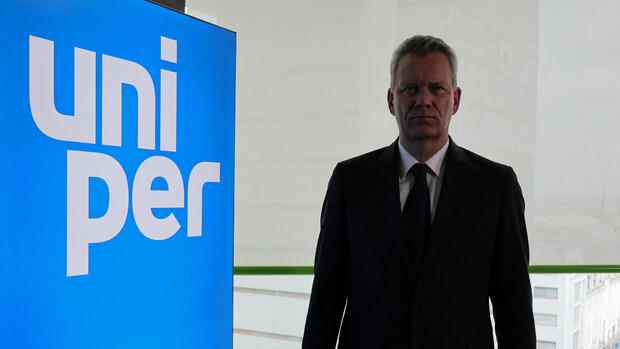The Düsseldorf-based company has long-standing gas supply contracts with the Russian energy supplier Gazprom.
(Photo: Reuters)
Dusseldorf The German gas group Uniper, which is threatened with its existence, receives higher loans from the state development bank KfW than originally assumed. A Uniper spokesman told Handelsblatt that the bank had approved an expansion of the existing credit line by a further four billion euros earlier in the week.
According to the Bloomberg news agency, Uniper boss Klaus-Dieter Maubach had previously said at the beginning of the week on the sidelines of the Gastech industry conference in Milan: Losses from the procurement of replacements for missing Russian gas deliveries could reach the seven billion euro mark this month.
According to the Uniper boss, a so-called backstop was included in the rescue package that was agreed with the federal government in July. New state aid is now needed. He originally assumed that the sum of seven billion euros would only be reached in the fourth quarter. Maubach said to the US news channel CNBC: “The worst is yet to come.”
Uniper runs out of government loans
Uniper ran out of government loans available to date before the official rescue package for the crisis group was even approved. The EU Commission has yet to approve the package, the preliminary contents of which have been known since July. After that, the Uniper shareholders have to agree at an extraordinary general meeting. There is no date for this yet.
Top jobs of the day
Find the best jobs now and
be notified by email.
Uniper has a major problem in the current energy crisis and the conflict with Russia: The Düsseldorf-based company has long-term gas supply contracts with the Russian energy supplier Gazprom, but no longer receives any gas from there.
The group has growing liquidity problems.
(Photo: dpa)
Uniper still has to supply its own customers with gas that the group can no longer get easily. Uniper therefore has to buy gas expensively on the exchange and pass it on to its customers at cheaper, long-term prices. The higher the gas price rises and the less gas comes from Russia, the greater the losses.
The state had therefore announced that it would take a 30 percent stake in Uniper and also make 7.7 billion euros available, which should have a similar effect to equity. It is unclear whether this money from the aid package that has not yet been approved has even reached Uniper.
“The state must save Uniper, that’s clear”
In addition to the equity-like money, Uniper receives said loans from the state development bank KfW. A few weeks ago, Uniper boss Maubach said that his company could already access these loans. The framework was nine billion euros. But this money has already been exhausted: At the end of August, Uniper applied for further government loans with a volume of four billion euros. KfW has now approved the expansion of the loans.
The fact that Uniper needs so much more money than originally agreed is due to the escalation of the crisis. When the aid package was put together, Gazprom was still delivering 40 percent of the planned gas volume through the important Nord Stream 1 pipeline. But deliveries are currently completely suspended. So Uniper has to replace far more gas at great expense.
There is also another problem: Uniper sells gas and electricity on the stock exchange. The company often offers deliveries at a later date. For this, Uniper has to deposit security deposits.
>> Read also: Price limit on the electricity market could be set at 200 euros per megawatt hour
This means that Uniper has to pay a kind of deposit that it only gets back when it actually delivers the promised amount of gas or electricity. The more expensive electricity and gas are, the greater the security must be. Uniper therefore needs enormous amounts of money to even be able to offer electricity and gas on the exchange.
Financial support for Uniper is becoming increasingly expensive for the state and, in the future, probably also for German taxpayers. Not saving the company is not an option. Then a huge supplier of gas would be missing in the market, thousands of households and companies in Germany would no longer know where to get gas for heating and for their industrial production.
Guido Hoymann, analyst at Metzler Bank, says: “The state has to save Uniper, that’s clear. Presumably, the firm promise of government aid weighs more heavily than individual balance sheet ratios.” In other words: even if things look even more bleak for the company than before, government money should continue to flow, other actors are probably counting on that. Hoymann says: “Even if Uniper is now making even greater losses than originally assumed, Uniper should continue to be accepted on the exchanges as a trading partner for electricity and gas.”
More: Entry into deindustrialization? High energy prices threaten German companies

